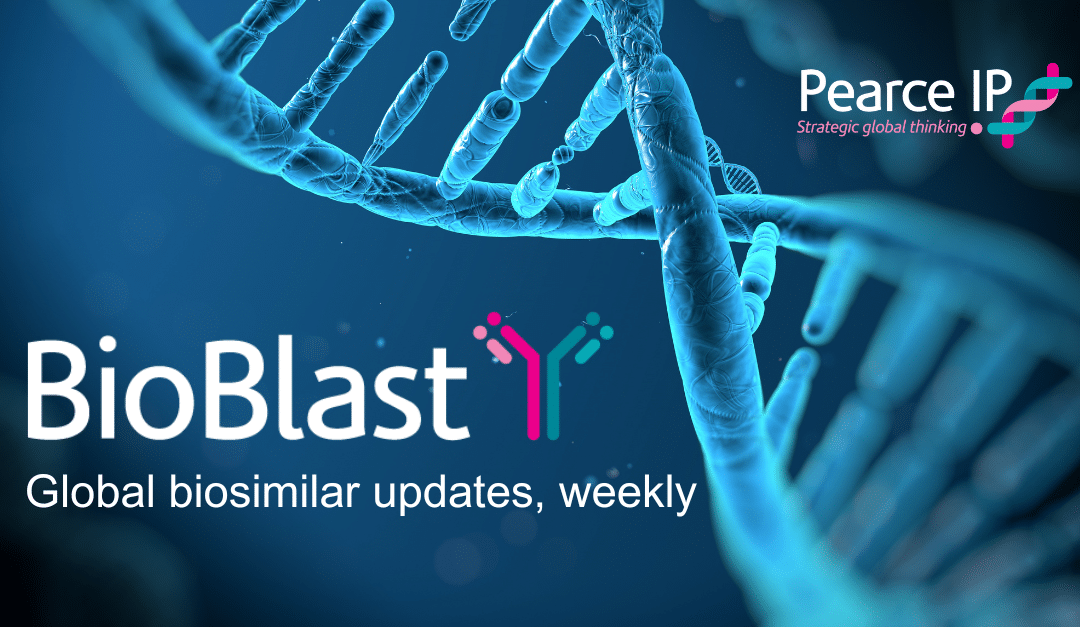The FDA approved Vertex/CRISPR Therapeutics’ Casgevy® and Bluebird Bio’s Lyfgenia®, the first cell-based gene therapies to treat sickle cell disease in patients 12 years and older. Casgevy® is the first FDA-approved treatment that uses CRISPR/Cas9 to genetically modify a patients’ hematopoietic stem cells. Lyfgenia® uses a lentiviral vector for genetic modification and is approved to treat patients with a history of vaso-occlusive events.
In each instance, the patient’s blood stem cells are harvested, and treated and the modified stem cells are transplanted into the patient where they engraft within the bone marrow and increase the production of foetal haemoglobin (for Casgevy®) and HbAT87Q, a gene-therapy derived haemoglobin that functions similarly to haemoglobin A (for Lyfgenia®), and in each instance the increased levels of reduce the risk of red blood cells sickling.
Bio-Thera announced that its Avzivi® (BAT1706), biosimilar to Genentech’s Avastin® (bevacizumab) is FDA approved with a full indication set (excluding hepatocellular carcinoma). Bio-Thera is the only Chinese company to have received marketing approval for a biosimilar in the US, and this is the second Bio-Thera biosimilar to be US approved.
The Avzivi trade name is owned by Novartis, but the product will be marketed by Sandoz in the US pursuant to the license and commercialisation agreement entered into between Bio-Thera and Sandoz in September 2021. Avzivi® is currently under regulatory review by the EMA (MA submitted on 26 November 2020). Avzivi® has already been approved in China and is being supplied as Pobevcy®.
The National Institute for Health and Care Excellence (NICE) issued final draft guidance recommending AstraZeneca/Merck’s Lynparza® (olaparib) with bevacizumab be routinely used in the NHS in England and Wales for maintenance treatment of high-grade epithelial ovarian, fallopian tube or primary peritoneal cancer in adults whose cancer has completely or partially responded after first-line platinum-based chemotherapy with bevacizumab, is advanced (stages 3 and 4) and is HRD positive (BRCA1 or BRCA2 mutation or genomic instability).
On 24 August 2023, AstraZeneca announced the Japanese MHLW expanded the approval for Lynparza® with abiraterone to treat BRCAm mCRPC.
Bioeq and Teva jointly announced that Health Canada granted a Notice of Compliance for Ranopto® (ranibizumab), biosimilar to Genentech’s Lucentis® (ranibizumab). Ranopto® is indicated for the treatment of neovascular (wet) age-related macular degeneration, the treatment of visual impairment due to diabetic macular oedema or choroidal neovascularization, as well as the treatment of visual impairment due to macular oedema secondary to retinal vein occlusion.
FYB201/Ranopto® was developed by Bioeq (a JV between Formycon and Polpharma Biologics). Teva entered into a strategic partnership for the exclusive commercialisation of FYB201 in Canada, Europe and selected other countries in mid 2021. Following successful approvals in the UK (marketed as Ongavia® by Teva) in May 2022, as well as the US (marketed as Cimerli® by Coherus) and the EU (as Ranivisio®) in August 2022, Ranopto® is expected to launch in Canada in Q1 2024. MS Pharma will commercialise FYB201 in the Middle East and North Africa (MENA) region following approval by the relevant regulatory authorities.
This is the third ranibizumab biosimilar approved in Canada, after Samsung Bioepis’ Byooviz® was approved in March 2022, and Roche’s Susvimo® was approved in September 2022.
Dr. Reddy’s and Coya Therapeutics today announced that they have entered into a development and license agreement for the development and commercialisation of COYA302, an investigational combination therapy for the treatment of Amyotrophic Lateral Sclerosis (ALS). COYA302 is a co-pack kit containing a combination of low dose IL-2 and CTLA-4 Ig (abatacept).
Under the agreement Coya granted Dr. Reddy’s an exclusive license to commercialise COYA302 in the US, Canada, the EU and the UK for ALS. The new agreement is in addition to the exclusive worldwide licensing agreement between the companies to use the Dr Reddy’s abatacept biosimilar (to BMS’ Orenica®) to develop and commercialise COYA302 on 20 March 2023. Coya retains the right to commercialise COYA302 for patients with ALS in Japan, Mexico and South America. Coya will have responsibility for the clinical development of COYA302 and for seeking regulatory approval in US.
Bristol Myers Squibb (BMS) announced that the FDA has accepted for priority review its supplemental Biologics License Application (sBLA) for Opdivo® (nivolumab) in combination with cisplatin-based chemotherapy as a first-line treatment for adult patients with unresectable or metastatic urothelial carcinoma. The FDA assigned a PDUFA goal date of 5 April 2024.
On 30 October 2023, the European Medicines Agency validated BMS’s type II variation application for Opdivo® for the above condition.
Roche and Carmot Therapeutics announced a US$2.7B agreement for Roche to acquire Carmot Therapeutics, including its R&D portfolio of clinical stage incretins. The deal also provides for potential additional milestone payments of up to US$400M.
As part of the acquisition, Roche will acquire:
- CT-388, the lead asset, a Phase-2 ready, dual GLP-1/GIP receptor agonist for the treatment of obesity in patients with and without type 2 diabetes;
- CT-996, a small molecule GLP-1 receptor agonist currently in Phase-1 intended to treat obesity in patients with and without type 2 diabetes; and
- CT-868, a Phase-2, dual GLP-1/GIP receptor agonist intended for the treatment of type 1 diabetes patients with overweight or obesity.
On 9 May 2023, Roche acquired worldwide rights to Zion Pharma’s ZN-A-1041 (oral HER2 TKI).
New Zealand’s Pharmac has listed Celltrion’s Herzuma®, biosimilar to Genentech’s Herceptin®, on the Pharmaceutical Schedule for the treatment of breast cancer expressing HER-2 IHC 3+ or ISH+ (including FISH or other current technology). Patients taking Herceptin® will need to move to Herzuma® by 1 June 2024 as Herceptin® will be delisted from the Schedule.

Naomi Pearce
CEO, Executive Lawyer (AU, NZ), Patent & Trade Mark Attorney (AU, NZ)
Naomi is the founder of Pearce IP, and is one of Australia’s leading IP practitioners. Naomi is a market leading, strategic, commercially astute, patent lawyer, patent attorney and trade mark attorney, with over 25 years’ experience, and a background in molecular biology/biochemistry. Ranked in virtually every notable legal directory, highly regarded by peers and clients, with a background in molecular biology, Naomi is renown for her successful and elegant IP/legal strategies.
Among other awards, Naomi is ranked in Chambers, IAM Patent 1000, IAM Strategy 300, is a MIP “Patent Star”, and is recognised as a WIPR Leader for patents and trade marks. Naomi is the 2023 Lawyers Weekly “IP Partner of the Year”, the 2022 Lexology client choice award recipient for Life Sciences, the 2022 Asia Pacific Women in Business Law “Patent Lawyer of the Year” and the 2021 Lawyers Weekly Women in Law SME “Partner of the Year”. Naomi is the founder of Pearce IP, which commenced in 2017 and won 2021 “IP Team of the Year” at the Australian Law Awards.

Sian Hope
Lawyer
Sian is a life sciences focussed intellectual property lawyer with a particular focus on the pharmaceutical, biotechnology and healthcare industries. Her practice is primarily in patent litigation, but includes non-contentious patent matters, trade mark matters, health regulatory legal matters and consumer law.

